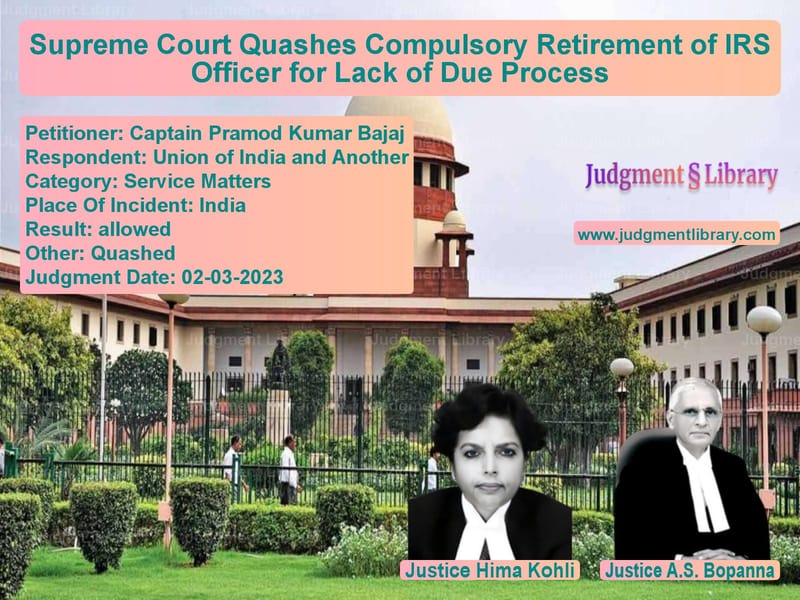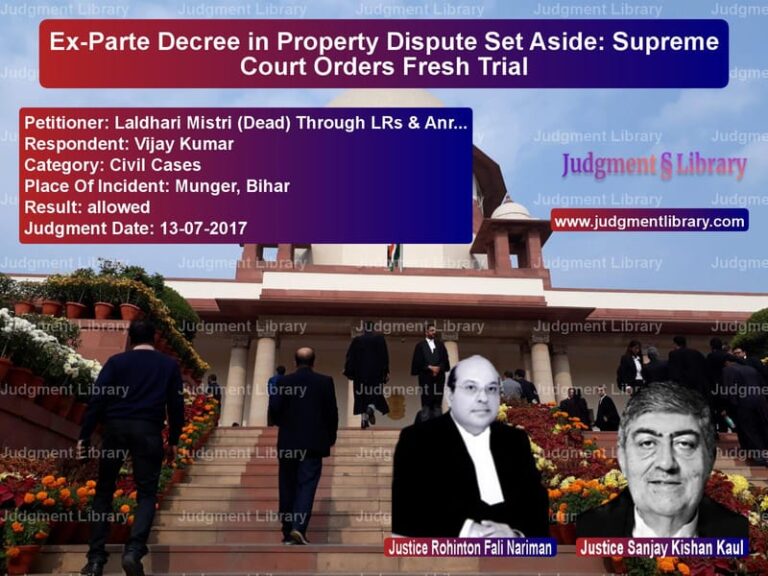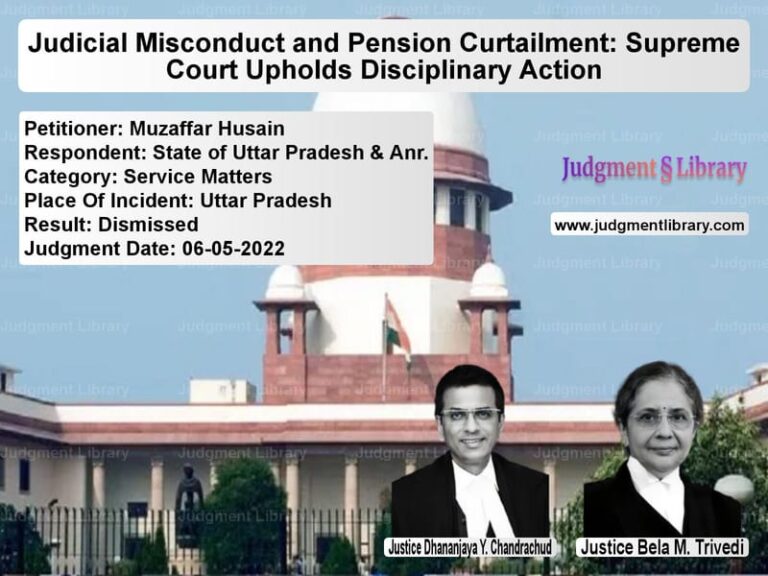Supreme Court Quashes Compulsory Retirement of IRS Officer for Lack of Due Process
The Supreme Court of India recently delivered a landmark ruling in the case of Captain Pramod Kumar Bajaj v. Union of India & Anr., quashing the compulsory retirement order issued against the appellant. The ruling is significant as it reinforces the necessity for fairness, transparency, and adherence to legal principles in service matters, particularly regarding compulsory retirement under Fundamental Rule 56(j). The judgment underscores the importance of due process and non-arbitrariness in decisions that impact an officer’s career.
Background of the Case
The case involved Captain Pramod Kumar Bajaj, a former Indian Revenue Service (IRS) officer who was compulsorily retired from service by an order dated September 27, 2019. The order was issued by the Central Board of Direct Taxes (CBDT), exercising powers under Rule 56(j) of the Fundamental Rules. The appellant challenged the decision, alleging that it was punitive and based on biased considerations.
The appellant was a former commissioned officer in the Indian Army, later inducted into the IRS in 1990 after qualifying the Civil Services Examination. He was promoted to various senior positions and, in 2012, was appointed as Commissioner of Income Tax. In 2014, he was selected for appointment as a Member of the Income Tax Appellate Tribunal (ITAT). However, his appointment was stalled due to adverse Intelligence Bureau (IB) reports, and subsequent vigilance actions were taken against him.
Legal Issues Considered
- Whether the order of compulsory retirement under Rule 56(j) was justified in the absence of adverse service records.
- Whether the vigilance actions and adverse IB report were sufficient grounds for compulsory retirement.
- Whether the appellant’s inclusion in the “Agreed List” (a list of officers with suspected integrity) was legally justified.
- Whether the decision to retire the appellant three months before superannuation was arbitrary and punitive.
Arguments of the Parties
Petitioner’s Arguments (Captain Pramod Kumar Bajaj)
- The order of compulsory retirement was punitive in nature and was aimed at preventing his appointment to the ITAT.
- He had an unblemished service record with consistently “Outstanding” performance ratings and integrity assessments marked as “Beyond Doubt”.
- The adverse IB report used against him was based on his matrimonial dispute with his estranged wife and had no relevance to his professional conduct.
- Vigilance proceedings were initiated only after he had challenged the government’s inaction in forwarding his ITAT appointment.
- The decision to compulsorily retire him three months before superannuation indicated mala fide intent.
Respondent’s Arguments (Union of India)
- The government has the absolute right to retire an officer in the public interest under Rule 56(j).
- The officer was under vigilance scrutiny due to multiple complaints, and his inclusion in the “Agreed List” was justified.
- Compulsory retirement does not amount to a punishment but is an administrative decision.
- Courts should not interfere in executive decisions regarding service matters unless there is clear evidence of malice or arbitrariness.
Key Observations of the Supreme Court
The Supreme Court, after examining the records, ruled in favor of the appellant, making the following observations:
- Lack of Adverse Service Records: The Court noted that the appellant had been consistently rated “Outstanding” in his Annual Performance Appraisal Reports (APARs) and had never been subject to disciplinary action before the controversy over his ITAT appointment.
- Questionable Vigilance Actions: The Court found that the vigilance proceedings initiated against the appellant were retaliatory and designed to prevent his appointment to ITAT.
- Misuse of Intelligence Bureau Reports: The adverse IB report was based on personal issues unrelated to the officer’s professional integrity.
- Bias in the Decision-Making Process: The Supreme Court found that officers involved in the compulsory retirement decision were themselves facing contempt proceedings for failing to comply with judicial directives regarding the appellant’s ITAT appointment.
- Violation of Natural Justice: The Court ruled that the process lacked transparency and fairness, violating the principles of natural justice.
Key Judgment Excerpts
The Supreme Court observed:
“An order of compulsory retirement must not be a disguised punishment. If there is no adverse service record, and the decision is based on extraneous factors, it is arbitrary and must be set aside.”
The Court further held:
“The action against the petitioner appears to be motivated by considerations beyond public interest. Fundamental Rule 56(j) cannot be used as a tool to settle scores or to obstruct an officer’s legitimate career progression.”
Final Judgment
The Supreme Court ruled in favor of the appellant and issued the following directives:
- The compulsory retirement order dated September 27, 2019, was quashed.
- All adverse consequences flowing from the retirement order were set aside.
- The appellant was entitled to full retirement benefits and any consequential service benefits.
- The Court directed that similar cases of compulsory retirement must be carefully scrutinized to prevent misuse of Rule 56(j).
Implications of the Judgment
The ruling has significant implications for service law and administrative justice:
- Strengthens Due Process: Officers cannot be compulsorily retired arbitrarily, and due process must be followed.
- Prevents Misuse of Rule 56(j): The judgment ensures that compulsory retirement is not used as a tool for political or bureaucratic vendetta.
- Reinforces Judicial Oversight: The Supreme Court reaffirmed its role in protecting individuals from executive excesses.
- Ensures Transparency in Appointments: The judgment upholds fairness in judicial and quasi-judicial appointments, ensuring that qualified individuals are not sidelined due to bureaucratic maneuvering.
Conclusion
The Supreme Court’s ruling in Captain Pramod Kumar Bajaj v. Union of India is a landmark decision that underscores the need for fairness and transparency in service matters. By setting aside an arbitrary compulsory retirement order, the Court has reinforced legal safeguards against administrative misuse of power. This judgment will serve as a crucial precedent in ensuring that public servants are treated fairly and that their careers are not disrupted by extraneous factors.
Read also: https://judgmentlibrary.com/supreme-court-upholds-police-authoritys-discretion-in-recruitment-case/
Petitioner Name: Captain Pramod Kumar Bajaj.Respondent Name: Union of India and Another.Judgment By: Justice Hima Kohli, Justice A.S. Bopanna.Place Of Incident: India.Judgment Date: 02-03-2023.
Don’t miss out on the full details! Download the complete judgment in PDF format below and gain valuable insights instantly!
Download Judgment: captain-pramod-kumar-vs-union-of-india-and-a-supreme-court-of-india-judgment-dated-02-03-2023.pdf
Directly Download Judgment: Directly download this Judgment
See all petitions in Public Sector Employees
See all petitions in Employment Disputes
See all petitions in Disciplinary Proceedings
See all petitions in Judgment by Hima Kohli
See all petitions in Judgment by A. S. Bopanna
See all petitions in allowed
See all petitions in Quashed
See all petitions in supreme court of India judgments March 2023
See all petitions in 2023 judgments
See all posts in Service Matters Category
See all allowed petitions in Service Matters Category
See all Dismissed petitions in Service Matters Category
See all partially allowed petitions in Service Matters Category







